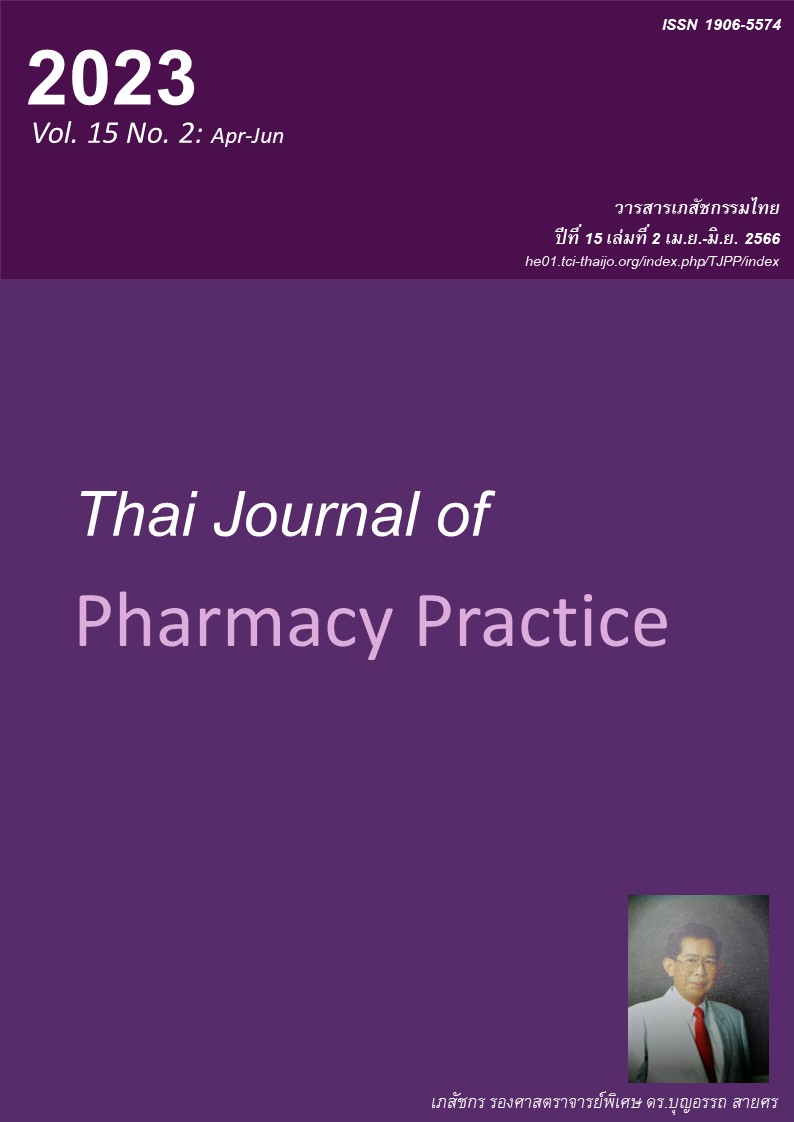ความผาสุกทางจิตวิญญาณของผู้ป่วยโรคไตวายเรื้อรังระยะสุดท้าย ที่รักษาแบบประคับประคองในโรงพยาบาลสิรินธร จังหวัดขอนแก่น
Main Article Content
บทคัดย่อ
วัตถุประสงค์: เพื่อศึกษาความผาสุกทางจิตวิญญาณ (spiritual well-being: SWB) ของผู้ป่วยโรคไตวายเรื้อรังระยะสุดท้ายที่ได้รับการรักษาแบบประคับประคอง (end stage renal disease patients with comprehensive conservative treatment: ESRD-CCT) วิธีการ: การศึกษานี้เป็นการวิจัยเชิงพรรณนาในกลุ่มตัวอย่าง ESRD-CCT จำนวน 140 คน ซึ่งมารับบริการที่คลินิกผู้ป่วยนอกเฉพาะทางโรคไตเรื้อรัง โรงพยาบาลสิรินธร จังหวัดขอนแก่น ในระหว่างเดือนกุมภาพันธ์ถึงเมษายน พ.ศ. 2564 การศึกษาเก็บข้อมูล SWB โดยการสัมภาษณ์ผู้ป่วยด้วยแบบสอบถามฉบับภาษาไทย 2 ฉบับ เพื่อยืนยันผลการศึกษา ได้แก่ World Health Organization’s Quality Of Life- Spirituality, Religion and Personal Beliefs (WHOQOL-SRPB BREF) และ Functional Assessment of Chronic Illness Therapy-spiritual well-being scale (FACIT-Sp) ผลการวิจัย: ผู้ป่วย ESRD-CCT มีค่ามัธยฐานคะแนน SWB โดยรวม (ส่วนเบี่ยงเบนควอไทล์) จากแบบสอบถาม WHOQOL-SRPB BREF เท่ากับ 3.6 (1.0) จากคะแนนเต็ม 5 จึงมี SWB อยู่ในระดับปานกลางถึงมาก ส่วนแบบสอบถาม FACIT-Sp มีค่ามัธยฐานเท่ากับ 34.0 (9.0) จึงมี SWB อยู่ในระดับปานกลางถึงค่อนข้างมาก สรุป: ผู้ป่วย ESRD-CCT มีระดับ SWB อยู่ในระดับปานกลางถึงมาก ผลการศึกษานี้สามารถนำไปใช้เป็นข้อมูลสำหรับบุคคลากรทางการแพทย์ในการดูแลด้านจิตวิญญาณของผู้ป่วยโรคไตวายเรื้อรังระยะสุดท้ายแบบองค์รวม เพื่อให้ผู้ป่วยมี SWB ที่ดีต่อไปในอนาคต
Article Details

อนุญาตภายใต้เงื่อนไข Creative Commons Attribution-NonCommercial-NoDerivatives 4.0 International License.
ผลการวิจัยและความคิดเห็นที่ปรากฏในบทความถือเป็นความคิดเห็นและอยู่ในความรับผิดชอบของผู้นิพนธ์ มิใช่ความเห็นหรือความรับผิดชอบของกองบรรณาธิการ หรือคณะเภสัชศาสตร์ มหาวิทยาลัยสงขลานครินทร์ ทั้งนี้ไม่รวมความผิดพลาดอันเกิดจากการพิมพ์ บทความที่ได้รับการเผยแพร่โดยวารสารเภสัชกรรมไทยถือเป็นสิทธิ์ของวารสารฯ
เอกสารอ้างอิง
World Health Organization. The global burden of kidney disease and the sustainable development goals [online]. 2018 [cited Mar 10, 2019]. Available from: www.who.int/bulletin/volumes/96/6/17-206441/ en/.
Ministry of Public Health. Service plan in chronic kidney disease [online]. 2020 [cited Dec 23, 2020]. Available from: hdcservice.moph.go.th/hdc/reports/ report.
Nephrology Society of Thailand. Clinical practice recommendation for comprehensive conservative care in chronic kidney disease. Bangkok: Text and Journal Publication; 2017.
Murtagh FEM, Spagnolo AG, Panocchia N, Gambaro G. Conservative (non dialytic) management of end-stage renal disease and withdrawal of dialysis. Prog Palliat Care 2009; 7: 179-85.
Kongjun K. Spiritual well-being and spiritual needs in critically ill patients [master thesis]. Khon Kaen: Khon Kaen University; 2011.
Duangket C. The study of health-related quality of life and spiritual well-being of diabetes in amphur Kanta rawichai, Mahasarakham province [master thesis]. Khon Kaen: Khon Kaen University; 2019.
Chirico F. Spiritual well-being in the 21st century: It is time to review the current WHO’s health definition. J Health Soc Sci 2016; 1: 11-6.
Monod S, Brennan M, Rochat E, Martin E, Rochat S, Büla CJ. Instruments measuring spirituality in clinical research: A systematic review. J Gen Intern Med 2011; 26: 1345–57.
WHOQOL SRPB Group. A cross-cultural study of spirituality, religion, and personal beliefs as components of quality of life. Soc Sci Med 2006; 62: 1486-97.
Brady MJ, Peterman AH, Fitchett G, Hernandez L, Cella D. Measuring spiritual well-being in people with cancer: The Functional Assessment of Chronic Illness Therapy-Spiritual Well-Being scale (FACIT-Sp). Ann Behav Med 2002; 24: 49–58.
Saisunantararom W. Spiritual, quality of life, and depression of chronic kidney disease patients, Nachueak Hospital, Mahasarakham Province [master thesis]. Khon Kaen: Khon Kaen University; 2014.
Bragazzi NL, Puente GD. Chronic kidney disease, spirituality and religiosity: A systematic overview with the list of eligible studies. Health Psychol Res 2013; 1: e26. doi: 10.4081/hpr.2013.e26.
Yodchai K, Dunning T, Savage S, Hutchinson AM. The role of religion and spirituality in coping with kidney disease and haemodialysis in Thailand. Scand J Caring Sci 2017; 31: 359–67.
Bravin AM, Trettene AS, Andrade LG, Popim RC. Benefits of spirituality and/or religiosity in patients with chronic kidney disease: an integrative review. Rev Bras Enferm 2019; 72: 541-51.
Spinale J, Cohen SD, Khetpal P, Peterson RA, Clougherty B, Puchalski CM. Spirituality, Social Support, and Survival in Hemodialysis Patients. Clin J Am Soc Nephrol 2008; 3: 1620–27.
Cheawchanwattana A, Chunlertrith D, Saisunanta rarom W, Johns NP. Does the spiritual well-being of chronic hemodialysis patients differ from that of pre-dialysis chronic kidney disease patients? Religions 2015; 6: 14–23.
Skevington SM, Gunson KS, O'Connell KA. Intro ducing the WHOQOL-SRPB BREF: developing a short-form instrument for assessing spiritual, religious and personal beliefs within quality of life. Qual Life Res 2013; 22: 1073-83.
Jirawatkul A. Statistics for health science research. 4th ed. Bangkok: Wittayapat; 2015.
Bredle JM, Salsman JM, Debb SM, Arnold BJ, Cella D. Spiritual well-being as a component of health-related quality of life: The Functional Assessment of Chronic Illness Therapy—Spiritual Well-Being Scale (FACIT-Sp). Religions 2011; 2: 77-94.
Rusa SG, Peripato GI, Pavarini SCI, Inouye K, Zazzetta MS, Orlandi FS. Quality of life/spirituality, religion and personal beliefs of adult and elderly chronic kidney patients under hemodialysis. Rev Latino-Am 2014; 22: 911-17.
Fradelos EC. Spiritual well-being and associated factors in end-stage renal disease. Sci World J 2021; 2021: 6636854. doi: 10.1155/2021/6636854.
Ottaviani AC, Souza EN, Drago NC, Mendiondo MSZ, Pavarini SCI, Orlandi FS. Hope and spirituality among patients with chronic kidney disease undergoing hemodialysis: a correlational study. Rev Latino-Am 20 14; 22: 248-54.
Moura HCGB, Menezes TMO, Freitas RA, Moreira, FA, Pires IB, Nunes AMPB, et al. Faith and spirituality in the meaning of life of the elderly with chronic kidney disease. Rev Bras Enferm 2020; 73: 1-7.


